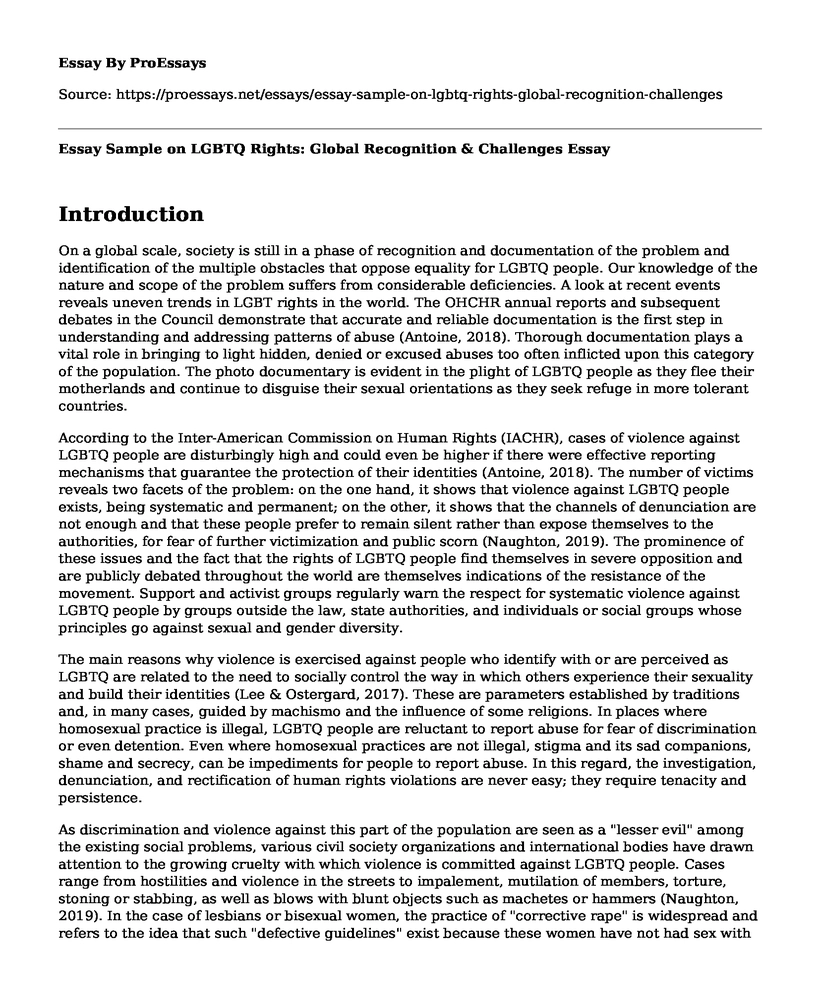Introduction
On a global scale, society is still in a phase of recognition and documentation of the problem and identification of the multiple obstacles that oppose equality for LGBTQ people. Our knowledge of the nature and scope of the problem suffers from considerable deficiencies. A look at recent events reveals uneven trends in LGBT rights in the world. The OHCHR annual reports and subsequent debates in the Council demonstrate that accurate and reliable documentation is the first step in understanding and addressing patterns of abuse (Antoine, 2018). Thorough documentation plays a vital role in bringing to light hidden, denied or excused abuses too often inflicted upon this category of the population. The photo documentary is evident in the plight of LGBTQ people as they flee their motherlands and continue to disguise their sexual orientations as they seek refuge in more tolerant countries.
According to the Inter-American Commission on Human Rights (IACHR), cases of violence against LGBTQ people are disturbingly high and could even be higher if there were effective reporting mechanisms that guarantee the protection of their identities (Antoine, 2018). The number of victims reveals two facets of the problem: on the one hand, it shows that violence against LGBTQ people exists, being systematic and permanent; on the other, it shows that the channels of denunciation are not enough and that these people prefer to remain silent rather than expose themselves to the authorities, for fear of further victimization and public scorn (Naughton, 2019). The prominence of these issues and the fact that the rights of LGBTQ people find themselves in severe opposition and are publicly debated throughout the world are themselves indications of the resistance of the movement. Support and activist groups regularly warn the respect for systematic violence against LGBTQ people by groups outside the law, state authorities, and individuals or social groups whose principles go against sexual and gender diversity.
The main reasons why violence is exercised against people who identify with or are perceived as LGBTQ are related to the need to socially control the way in which others experience their sexuality and build their identities (Lee & Ostergard, 2017). These are parameters established by traditions and, in many cases, guided by machismo and the influence of some religions. In places where homosexual practice is illegal, LGBTQ people are reluctant to report abuse for fear of discrimination or even detention. Even where homosexual practices are not illegal, stigma and its sad companions, shame and secrecy, can be impediments for people to report abuse. In this regard, the investigation, denunciation, and rectification of human rights violations are never easy; they require tenacity and persistence.
As discrimination and violence against this part of the population are seen as a "lesser evil" among the existing social problems, various civil society organizations and international bodies have drawn attention to the growing cruelty with which violence is committed against LGBTQ people. Cases range from hostilities and violence in the streets to impalement, mutilation of members, torture, stoning or stabbing, as well as blows with blunt objects such as machetes or hammers (Naughton, 2019). In the case of lesbians or bisexual women, the practice of "corrective rape" is widespread and refers to the idea that such "defective guidelines" exist because these women have not had sex with "real men". As the photo documentary shows, abuses are committed worldwide with victims going into exile to hide from discrimination in society.
Conclusion
Violence against LGBTQ people is the product of a complex tangle of practices and beliefs that guarantee discrimination and convert this part of the population into a target of attacks from early childhood to old age. There is no doubt that those who suffer most from violence are those who, in addition to identifying themselves as LGBTQ, are also vulnerable to other factors, such as poverty, ethnicity, lack of access to education or special needs (Naughton, 2019). The pending task is to ensure that these laws are accompanied by social changes that allow greater openness in the face of diversity and fewer practices that promote the idea that LGBTQ people would be led astray, immoral or a threat to the established order. Permanent and continuous attention needs to be given to the grievances faced by LGBTQ people worldwide as part of invoking empathy and better societal treatment of the special group.
References
Antoine, R. M. B. (2018). Access to Rights for Vulnerable Groups-LGBTI, Children, Afro-descendants, Indigenous people, Women and Persons with Disabilities in the Inter-American Human Rights System. Caribbean Journal of International Relations and Diplomacy, 5(1).
Lee, C., & Ostergard Jr, R. L. (2017). Measuring discrimination against LGBTQ people: A cross-national analysis. Human Rights Quarterly, 39(1), 37-72.
Naughton, J. (2019). Dual Shadows: East Africa's LGBT Refugees. Retrieved from https://www.blueearth.org/project/dual-shadows/
Cite this page
Essay Sample on LGBTQ Rights: Global Recognition & Challenges. (2023, Mar 27). Retrieved from https://proessays.net/essays/essay-sample-on-lgbtq-rights-global-recognition-challenges
If you are the original author of this essay and no longer wish to have it published on the ProEssays website, please click below to request its removal:
- Whole Women's Health V. Hellerstedt Paper Example
- Gay and Lesbian Parenting Essay Example
- Human Sexuality: A Biological and Social Study
- Paper Example on Teenage Pregnancies: Socio-Economic Influences
- Same-Sex Marriage: An Overview of Legalization and Social Reactions - Essay Sample
- Sexual Health - Report Example
- Irigaray's Ethics of Sex - Essay Example







